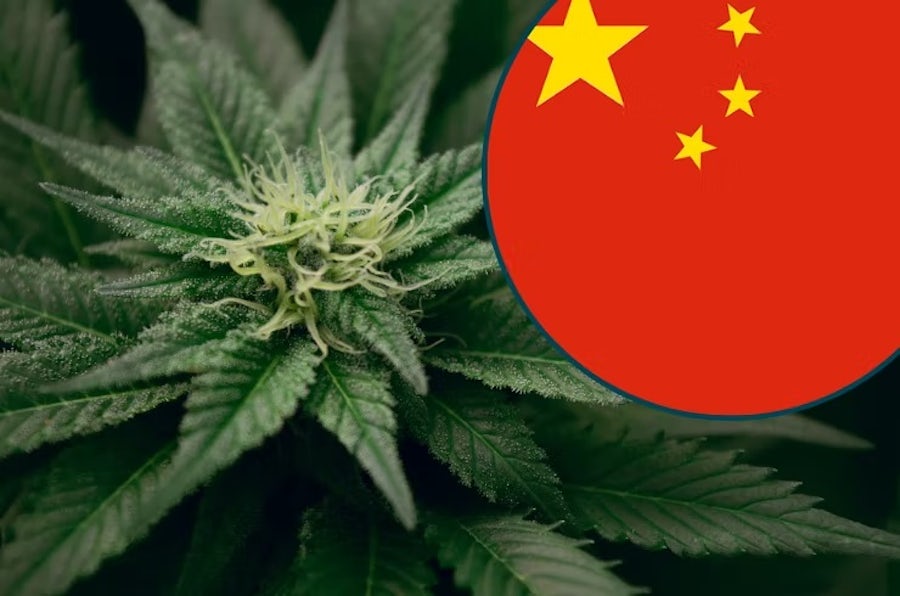

Recreational cannabis is illegal in China. The country does not have an existing medical marijuana program but recognizes some forms of traditional medicine from the cannabis plant. China has a large industrial hemp market and a long history with the cannabis plant. Despite the plant’s questionable legal status, China also has a large hemp cultivation and accessory manufacturing industry.
There is no recreational or medical cannabis market in China. Under the PRC Criminal Law, cannabis is legally classified as being equivalent to heroin, opium, morphine, and cocaine.
However, hemp has never been illegal in China and the county has a robust market for growing and manufacturing the plant. The government also allows companies to export THC products to other countries.
The health benefits of cannabis come up regularly in traditional Chinese medicine and the seeds, in particular, are often mentioned in Chinese writing. The philosophical works of Confucius, Mencius, Xunzi, Zhuangzi, and Mozi all discuss cannabis. Cannabis also plays a historical role in Taoism.
Archaeological records date the use of cannabis in China as far back as 12,000 years ago. Found in incense burners in ancient tombs as well as in fiber form, cannabis seems to have been used extensively in ancient China, for both its healing properties and as a spice alongside ginseng and ginger.
Ancient Chinese emperors such as Emperor Fu Hsi and Emperor Shen Nung displayed strong interests in cannabis, touting its medicinal benefits for rheumatism, menstrual problems, gout, malaria, and even absent-mindedness.China joined the Convention on Psychotropic Substances in 1985 and cannabis moved from a historical plant to a banned narcotic substance. But despite the obstacles, weed in China thrived and continues to thrive on the black market.

As mentioned above, weed in China is legally classified in the exact same way as any other illegal substance. This means punishments for the possession, cultivation, or use of cannabis can be severe. The maximum punishment for use of cannabis in China is 15 days’ detention in prison as well as a 2,000 yuan (around $325 USD) fine.
Meanwhile, possession, cultivation, and manufacture of cannabis charges carry much weightier punishments. Under Article 357 of the PRC Criminal Law, “smuggling, transporting, trafficking or manufacture” of cannabis is maximally punishable by death. How much these laws are applied, however, depends strongly on what region of China the offender is in, with provinces such as Shanghai and Xinjiang even being relaxed enough to allow the selling of cannabis products on the street.
Regulation of medical CBD and hemp products is also strict. However, it’s not quite so draconian. China has a robust industrial hemp manufacturing industry, making a range of products from textiles and ropes to cosmetics and more. Much of this product is exported and sold around the world; as of 2021 only hemp seeds and hemp fiber could be imported or sold in China. These products can only be extracted from the hemp leaf, and can only be bought from a short list of legally approved, Chinese companies. Currently, the only CBD and hemp products legally available in China are cosmetics like serums, sunscreens, and creams.

Despite legal obstacles, weed in China is thriving on the black market. The country produces, by one estimate, a whopping 50% of the world’s cannabis supply. Of the 606 patents filed around the world relating to cannabis products, 309 of them belong to Chinese companies. Chinese-based organizations have also been found to have links to black market operations abroad. One 2019 case found an illegal cannabis growing operation in Southern California funded by over $5 million USD wired from the Guangdong Province of China.
Like China’s global dominance in the cultivation of the plant, it also manufactures a sizable amount of the world’s cannabis accessories and devices. Data from 2021 found that of the 721 types of smoking accessories surveyed, every last one was exported from China. This is also true for ancillary products in more widely legalized markets, such as CBD markets and vape markets. With 90% of the world’s e-cigarettes made in China, it’s clear that the country dominates the market in accessories as well as cannabis cultivation.